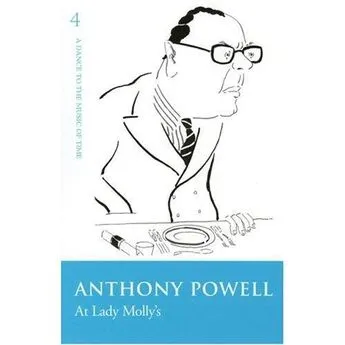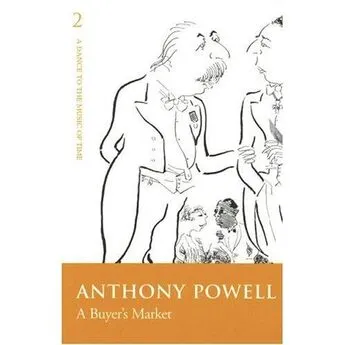Anthony Powell - At Lady Mollys
- Название:At Lady Mollys
- Автор:
- Жанр:
- Издательство:неизвестно
- Год:2005
- ISBN:нет данных
- Рейтинг:
- Избранное:Добавить в избранное
-
Отзывы:
-
Ваша оценка:
Anthony Powell - At Lady Mollys краткое содержание
A Dance to the Music of Time — his brilliant 12-novel sequence, which chronicles the lives of over three hundred characters, is a unique evocation of life in twentieth-century England.
The novels follow Nicholas Jenkins, Kenneth Widmerpool and others, as they negotiate the intellectual, cultural and social hurdles that stand between them and the “Acceptance World.”
At Lady Mollys - читать онлайн бесплатно полную версию (весь текст целиком)
Интервал:
Закладка:
Lovell and I used to alternate in which of us brought a car (both vehicles of modest appearance) to the Studio. That night it was Lovell’s turn to give me a lift. We said good night to Feingold, who was moving Hegarty off to the pub at the end of the road. Lovell had paid twelve pounds ten for his machine; he started it up, though not without effort. I climbed in beside him. We drove towards London through the mist, blue-grey pockets of cloud drifting up ominously from the river.
‘Shall we dine together?’
‘All right. Let it be somewhere cheap.’
‘Of that I am strongly in favour,’ said Lovell. ‘Do you know a place called Foppa’s?’
‘Yes — but don’t let’s go there.’
Although things had been ‘over’ with Jean for some time by then, Foppa’s was still for some reason too reminiscent of her to be altogether comfortable; and I was firmly of the opinion that even the smallest trace of nostalgia for the immediate past was better avoided. A bracing future was required, rather than vain regrets. I congratulated myself on being able to consider the matter in such brisk terms. Lovell and I settled on some restaurant, and returned to the question whether Sheldon would be able to arrange for the job to be offered at just the right moment: the moment when Lovell’s contract with the film company terminated, not before, nor too long after.
‘I’m going to look in on an aunt of mine after making a meal,’ Lovell said, tired at last of discussing his own prospects, ‘Why not come too? There are always people there. At worst, it’s a free drink. If some lovely girls are in evidence, we can dance to the gramophone.’
‘What makes you think there will be lovely girls?’
‘You may find anything at Aunt Molly’s — even lovely girls. Are you coming?’
‘I’d like to very much.’
‘It’s in South Kensington, I’m afraid.’
‘Never mind. Tell me about your aunt.’
‘She is called Molly Jeavons. She used to be called Molly Sleaford, you know.”
‘I didn’t know.’
Confident that Lovell would enjoy giving further information, I questioned him. He had that deep appreciation of family relationships and their ramifications that is a gift of its own, like being musical, or having an instinct for the value of horses or jewels. In Lovell’s own case, he made good practical use of this grasp, although such a talent not uncommonly falls to individuals more than usually free from any desire for personal advancement: while equally often lacking in persons rightly regarded by the world as snobbish. Lovell, almost as interested in everyone else’s family as his own, could describe how the most various people were in fact quite closely related.
‘When my first Sleaford uncle died,’ said Lovell, ‘his widow, Molly, married a fellow called Jeavons. Not a bad chap at all, though of rather unglamorous background. He couldn’t be described as particularly bright either, in spite of playing quite a good game of snooker. No live wire, in fact. Molly, on the other hand, is full of go.’
‘What about her?’
‘She was an Ardglass.’
‘Any relation of Bijou Ardglass?’
‘Sister-in-law, before Jumbo Ardglass divorced Bijou — who was his second wife, of course. Do you know her — probably slept with her? Most of one’s friends have.’
‘I’ve only seen her about the place. No other privileges.’
‘Of course, you wouldn’t be rich enough for Bijou,’ said Lovell, not unkindly. ‘But, as I was saying, Bijou got through what remained of the Ardglass money, which wasn’t much, and left Jumbo, who’d really had enough himself by that time. Since then, she has been keeping company with a whole string of people — Prince Theodoric — God knows who. However, I believe she still comes to see Molly. Molly is like that. She will put up with anyone.’
‘But why do you call him your “first” Sleaford uncle?’
‘Because he died, and I still have an uncle of that name — the present one is Geoffrey — the first, John. Uncle Geoffrey was too poor to marry until he succeeded. He could only just rub along in one of the cheaper cavalry regiments. There were two other brothers between him and the title. One was killed in the war, and the other knocked down by a bus.’
‘They don’t seem much good at staying alive.’
‘The thing about the Sleafords,’ said Lovell, ‘is that they’ve always been absolutely mad on primogeniture. That’s all very well in a way, but they’ve been so bloody mean to their widows and younger children that they are going to die out. They are a splendid example of upper-class stinginess. Geoffrey got married at once, as people do when they come into a peerage, however dim. Of course, in this case — with Dogdene thrown in — it was something worth having. Unfortunately they’ve never managed to knock up an heir.’
Lovell went on to describe his ‘first Sleaford uncle’, who seems to have been a chilly, serious-minded, competent peer, a great organiser of charitable institutions, who would have done well for himself in any walk of life. For a time he had been taken up with politics and held office under Campbell-Bannerman and Asquith.
‘He resigned at the time of the Marconi scandal,’ said Lovell. ‘He hadn’t been making anything on the side himself, but he thought some of his Liberal colleagues had been a bit too liberal in the ethics of their own financial dealings. He was a selfish old man, but had what is called an exaggerated sense of honour.’
‘I think I’ve seen Isbister’s portrait of him.’
‘Wearing the robes of the Garter. He took himself pretty seriously. Molly married him from the ballroom. She was only eighteen. Never seen a man before.’
‘When did he die?’
‘Spanish ’flu in 1919,’ said Lovell. ‘Molly first met Jeavons when Dogdene was a military hospital in the war. He was rather badly wounded, you know. The extraordinary thing was they didn’t start a love affair or anything. If Uncle John hadn’t died, she would still be — in the words of an Edwardian song my father hums whenever her name is mentioned—“Molly the Marchioness.”’
‘Where did she re-meet her second husband?’
‘At the Motor Show. Went to Olympia in her widow’s weeds and saw Jeavons again. He was acting as a polisher on one of the stalls. I can’t remember which make, but not a car anyone would be proud to own. That represented just about the height of what he could rise to in civil life. They were married about six months later.’
‘How does it go?’
‘Very well. Molly never seems to regret the Dogdene days in the least. I can’t think what they use for money, because, if I know the Sleafords, she didn’t get much in the way of a jointure — and I doubt if she has a hundred a year of her own. The Ardglass family have been hopelessly insolvent since the Land Act. However, she manages to support herself — and Jeavons — somehow. And also get some fun out of life.’
‘Doesn’t Jeavons bring in anything?’
‘Not a cent. I think he feels pretty ill most of the time. He often looks like death itself. Besides, he is quite unemployable. As a matter of fact, it isn’t true to say he does nothing. Once in a way he has some appliance he is marketing — an automatic bootjack or new cure for the common cold. Something he gets a commission on, or perhaps some firm is paying him a trifle to recommend the thing.’
The description made an impression on me. The picture of Jeavons took on a more positive shape: not a particularly attractive one. ‘Realism goes with good birth,’ Lovell used to say, and he himself certainly showed this quality where his own relations were concerned. The statement might be hard to substantiate universally, but, by recognising laws of behaviour operating within the microcosm of a large, consanguineous network of families, however loosely connected, individuals born into such a world often gain an unsentimental grasp of human conduct: a grasp sometimes superior to that of apparently more perceptive persons whose minds are unattuned by early association to the constant give and take of an ancient and tenacious social organism. Of course, it does not always work that way, but Lovell, with his many limitations, was himself a good example of the principle.
‘The chief reason I want to visit Aunt Molly,’ he said, ‘is to take another look at Priscilla Tolland, who is quite often there.’
‘A sister of Blanche Tolland?’
‘Yes. Do you know Blanche?’
‘Only by sight, and years ago. She is rather dotty, isn’t she?’
‘Quite dotty,’ said Lovell. ‘Lives in a complete world of her own. Fairly happy about it though, I think.’
‘Then there is one called Norah, isn’t there, who set up house with a rather strange girl I used to know called Eleanor Walpole-Wilson.’
‘That’s it. She is rather dotty too, but in a different way. That couple are said to be a ménage . Then there is Isobel. She is rather different. Priscilla is the youngest. She isn’t really “out” yet.’
I was about twenty-eight or twenty-nine at that period, to Lovell’s twenty-three or twenty-four, and through him had become aware for the first time that a younger generation was close on my heels. I told him I felt much too old and passé to take an interest in such small fry as young ladies who were not yet ‘out’.
‘Oh, I quite realise that,’ said Lovell indulgently. ‘There will certainly be elder persons there too for chaps like you who prefer serious conversation. You might like Isobel. I believe she is a bit of a highbrow when she isn’t going to night clubs.’
We drove precariously down Gloucester Road, the car emitting a series of frightening crepitations and an evil fume, while Lovell artlessly outlined his long-term plans for the seduction of Priscilla Tolland. We turned off somewhere by the Underground station. I liked the idea of going to this unknown place for an hour or so, surroundings where the cheerless Studio atmosphere might be purged away. Lovell stopped in front of a fairly large house of dark red brick, the architecture of which sounded a distant, not particularly encouraging, echo of the High Renaissance. After waiting on the doorstep for some time, the door was opened by a man of indeterminate age in shirt sleeves and carpet slippers. He might have passed for a butler. Pale and unhealthy looking, he had the air of having lived for months at a time underground in unventilated, overheated rooms. He brought with him odours of beer and cheese. Closer examination of this unkempt, moody fellow revealed him as older than he had appeared at first sight.
‘Good evening, Smith,’ said Lovell, rather grandly.
‘’Evening,’ said Smith, speaking without the smallest suggestion of warmth.
‘How are you, Smith?’
Smith looked Lovell up and down as if he considered the enquiry not merely silly, but downright insulting. He did not answer.
‘Is her Ladyship upstairs?’
‘Where do you think she’d be — in the basement?’
The tone of Smith’s voice made no concession whatever towards alleviating the asperity of this answer. Lovell showed no sign of surprise at being received so caustically, passing off the retort with a hearty laugh. Smith shambled off down the stairs, muttering to himself. He seemed thoroughly fed up, not only with Lovell, but also with his own job.
‘Smith is wonderful, isn’t he?’ said Lovell, as we mounted the staircase. ‘Aunt Molly sometimes borrows him from Erridge, when, for one reason or another, Thrubworth is closed down. I should warn you there is never an electric light bulb in the downstairs lavatory here and sometimes no bromo.’
Читать дальшеИнтервал:
Закладка:








